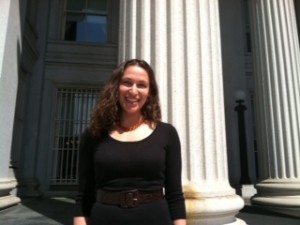By Kevin Gray
When asked to reflect on her life after Lafayette, Raisa Sheynberg ’04 describes many exciting opportunities—including her time as teaching assistant for former Secretary of State Madeleine Albright and her travels to Afghanistan, Pakistan, and Russia on behalf of the U.S. Treasury.

Raisa Sheynberg '04 at the U.S. Treasury Building, the oldest departmental building in Washington, D.C.
Sheynberg is a policy adviser on Afghanistan and Pakistan for the Office of Terrorist Financing and Financial Crimes (TFFC), which is supervised by the under secretary of terrorism and financial intelligence (TFI). The office is primarily responsible for protecting the U.S. financial system from rogue regimes, terrorist facilitators, proliferators, money launderers, and narcotics traffickers, as well as other national security threats.
She has often been the youngest participant in key international meetings on terrorist financing and national security. She has also attended meetings with some of the top Treasury officials, including David Cohen, former assistant secretary and acting under secretary of TFI, and Cohen’s successor in his former position, Daniel Glaser.
“Over the year and a half that I’ve been with the Treasury, I’ve gained knowledge in the field of illicit finance, and my superiors are now looking to me to add value to the conversation,” says Sheynberg, an international affairs graduate. “Decision makers are looking to the people in my position to know the facts of their portfolios and provide constructive and informed advice on important issues. It’s exciting to be part of the discussion.”
When not traveling, Sheynberg’s day-to-day responsibilities include writing, meeting with foreign officials, honing her awareness of relevant regulations, understanding political context, and keeping up with all the developments that could affect domestic and international relationships in Afghanistan and Pakistan.
“Afghanistan and Pakistan are of preeminent importance for our foreign policy and national security interests,” says Sheynberg. “We work very hard to have constructive relations with those governments.” She notes there has been movement in a positive direction.
“Both countries have taken important steps towards addressing the issue of illicit finance, and the U.S. government is committed to helping them build sound anti-money laundering and anti-terrorist financing regimes,” says Sheynberg, a native of Moldova. “We’re a ways off, but we’re optimistic.”
Being involved in foreign policy decision-making was a career goal for Sheynberg. While at Lafayette, she studied foreign policy and conflict resolution, focusing on negotiations in the Israeli-Palestinian conflict. She spent a semester at American University, during which she traveled to Northern Ireland to learn firsthand the nuances of the peace process.
Two pieces of advice have been key for Sheynberg. The first—to reach out to people who work in interesting places, and not necessarily those at the highest levels—helped her land a job at Americans for Peace Now, an Israeli-Palestinian advocacy organization.
“I observed the process of getting to a negotiated solution, how advocacy organizations talk to Congress, and how different organizations talk to each other,” she explains. “I got to see some of the backdoor maneuvering in Washington. I became frustrated with the process and the challenge of working for a small nonprofit, but also with not being able to take part substantively because I didn’t have the experience and credentials.”
Eventually, she left to attend graduate school at Georgetown University’s School of Foreign Service. She gained valuable experience in an internship on Capitol Hill and through being teaching assistant for Albright. She and the other assistants met with Albright each week to discuss topics and go over the progress of the course.
“She’s a brilliant, accomplished woman who has a sense of humor and cares about teaching and being a mentor to younger generations interested in foreign policy, particularly women,” Sheynberg says. “It was a very rewarding year.”
After receiving her master’s, Sheynberg completed a fellowship in Moscow, where she worked on macroeconomic analysis in the research and analysis department of Russia’s largest private bank.
The second piece of advice was that there is no one “right” path to accomplishing one’s goals. She now puts greater emphasis on gaining diverse experiences.
For instance, Sheynberg recently discovered a passion for teaching. She volunteers with a friend for a college preparatory program through Georgetown, teaching a global awareness class to a group of high school students from underserved socioeconomic areas of Washington, D.C.
“I spend Saturday mornings with a bunch of really smart kids who just haven’t had many opportunities,” she says. “I get to listen to fresh perspectives and maybe open their eyes to something new in the world. I know for sure that they’ve opened my eyes tremendously.”
